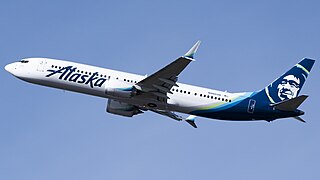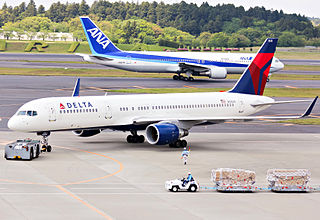Related Research Articles

An aerospace manufacturer is a company or individual involved in the various aspects of designing, building, testing, selling, and maintaining aircraft, aircraft parts, missiles, rockets, or spacecraft. Aerospace is a high technology industry.
Bombardier Aviation is a division of Bombardier Inc. It is headquartered in Dorval, Quebec, Canada. Its most popular aircraft included the Dash 8 Series 400, CRJ100/200/440, and CRJ700/900/1000 lines of regional airliners, and the newer CSeries. It also manufactured the Bombardier 415 amphibious water-bomber, and currently makes the Global Express and the Challenger lines of business jets.

The Boeing 787 Dreamliner is an American wide-body jet airliner developed and manufactured by Boeing Commercial Airplanes. After dropping its unconventional Sonic Cruiser project, Boeing announced the conventional 7E7 on January 29, 2003, which focused largely on efficiency. The program was launched on April 26, 2004, with an order for 50 aircraft from All Nippon Airways (ANA), targeting a 2008 introduction. On July 8, 2007, a prototype 787 was rolled out without major operating systems, and then the aircraft experienced multiple delays until its maiden flight on December 15, 2009. Type certification was received in August 2011 and the first 787-8 was delivered in September 2011 before entering commercial service on October 26, 2011, with ANA.

Parker Hannifin Corporation, originally Parker Appliance Company, usually referred to as just Parker, is an American corporation specializing in motion and control technologies. Its corporate headquarters are in Mayfield Heights, Ohio, in Greater Cleveland.

Philip Murray Condit is an American engineer and businessman who was Chair and Chief executive officer (CEO) of the Boeing company from 1996 to 2003. He dramatically reshaped the company by its merger with McDonnell Douglas and relocating Boeing's headquarters from Seattle to Chicago. He resigned to take symbolic responsibility for a military procurement scandal, although he was not accused of any ethical breaches.

Safran S.A. is a French multinational company that designs, develops and manufactures aircraft engines, rocket engines as well as various aerospace and defense-related equipment or their components. It was formed by a merger between SNECMA and the defense electronics specialist SAGEM in 2005. Safran's acquisition of Zodiac Aerospace in 2018 significantly expanded its aeronautical activities.
John Leahy is an American businessman. He is a former chief operating officer–Customers at Airbus (2005–2017), as well as the company's chief commercial officer between August 1994 and 2017, and a former member of the Airbus main board of management. Well known as one of the commercial aviation industry's most prolific aircraft salesmen, he made a significant contribution to the increase in Airbus's market share, from 18% in 1993 to 57% a decade later. He is responsible for over $1 trillion in sales.

Spirit AeroSystems Holdings, Inc., based in Wichita, Kansas, United States, is an American aerostructure manufacturer, and is the world's largest first-tier aerostructures manufacturer. The company builds several important pieces of Boeing aircraft, including the fuselage of the 737, and 787, as well as the flight deck section of the fuselage of nearly all of Boeing airliners. Spirit also produces fuselage sections and front wing spars for the Airbus A350. Spirit's main competition comes from Collins Aerospace, Kawasaki Heavy Industries, Leonardo, and Triumph Group.
GE Aviation Systems is an American aerospace engineering, aircraft engine and aircraft parts manufacturer.

KC-X was the United States Air Force (USAF) program to procure its next-generation aerial refueling tanker aircraft to replace some of their older Boeing KC-135 Stratotankers. The contest was for a production contract for 179 new tankers with estimated value of US$35 billion. The two contenders to replace the KC-135 aircraft were Boeing and EADS, following the elimination of US Aerospace, Inc. from the bidding process.

The competition between Airbus and Boeing has been characterized as a duopoly in the large jet airliner market since the 1990s.

The Boeing 737 MAX is the fourth generation of the Boeing 737, a narrow-body airliner manufactured by Boeing Commercial Airplanes, a division of American company Boeing. It succeeds the Boeing 737 Next Generation (NG) and competes with the Airbus A320neo family. The new series was announced on August 30, 2011. It took its maiden flight on January 29, 2016 and was certified by the United States Federal Aviation Administration (FAA) in March 2017. The first delivery was a MAX 8 in May 2017 to Malindo Air, with which it commenced service on May 22, 2017.

The Boeing 777X is the latest series of the long-range, wide-body, twin-engine jetliners in the Boeing 777 family from Boeing Commercial Airplanes. The 777X features new GE9X engines, new composite wings with folding wingtips, greater cabin width and seating capacity, and technologies from the Boeing 787. The 777X was launched in November 2013 with two variants: the 777-8 and the 777-9. The 777-8 provides seating for 384 passengers and has a range of 8,745 nautical miles [nmi] while the 777-9 has seating for 426 passengers and a range of over 7,285 nmi.

The Alaska Airlines fleet consists of a mainline fleet consisting of all Boeing 737 series aircraft operated directly by Alaska Airlines and a regional fleet operated with Alaska branded Embraer 175 jets by the Alaska Air Group owned regional airline Horizon Air and contractor SkyWest Airlines.

The middle of the market, often abbreviated MoM, is the airliner market between the narrowbody and the widebody aircraft, a market segmentation used by Boeing Commercial Airplanes since at least 2003. Both Airbus and Boeing produce aircraft that serve this segment.

The New Midsize Airplane (NMA), or New Midsize Aircraft, is a concept airliner proposed by Boeing to fill the middle of the market segment.
Today's Airbus SE is the product of international consolidation in the European aerospace industry tracing way before the formation of the Airbus Industrie GIE consortium in 1970. In 2000, the European Aeronautic Defence and Space Company (EADS) NV was established through the merger of Aerospatiale of France and DASA from Germany, and that subsequently bought Construcciones Aeronauticas from Spain. In addition to opther subsidiaries pertaining to security and space activities, EADS owned 100% of the pre-existing Eurocopter SA, established in 1992, as well as 80% of Airbus Industrie GIE. In 2001, Airbus Industrie GIE was reorganised as Airbus SAS, a simplified joint-stock company. In 2006, EADS acquired the remaining 20% shares of Airbus Industrie GIE from BAE Systems. EADS NV was renamed Airbus Group NV and SE in 2014, and 2015, respectively. Due to the commercial aircraft division's prominence within Airbus SE with it representing the largest part of the corporation's activities, Airbus S.A.S was published to be merged into the parent company in January 2017, but it was never done. Airbus SE remains therefore as the holding company for the commercial aircraft subsidiary Airbus SAS, while also being the parent company of the other two divisions Airbus Defence and Space and Airbus Helicopters. The company was given its present name in April 2018.

Boeing Brasil–Commercial was a proposed, but failed joint venture between Boeing and Embraer to design, build, and sell commercial airliners worldwide. The partnership was established in February 2019, after Boeing agreed to purchase an 80% stake in Embraer's commercial aircraft division. The deal was approved by Embraer's shareholders and was expected to close in June 2020 pending antitrust reviews, but in April 2020 Boeing terminated the joint venture deal due to impact of the 2019–20 coronavirus pandemic on aviation and market uncertainty. Embraer alleges that the financial impact of the Boeing 737 MAX groundings contributed to the demise of the deal, while others allege that U.S. labor and political considerations played a role.

This is the history of American aerospace manufacturing company Boeing.

The two fatal Boeing 737 MAX crashes in October 2018 and March 2019 which were similar in nature – both aircraft were newly delivered and crashed shortly after takeoff – and the subsequent groundings of the global 737 MAX fleet drew mixed reactions from multiple organizations. Boeing expressed its sympathy to the relatives of the Lion Air Flight 610 and Ethiopian Airlines Flight 302 crash victims, while simultaneously defending the aircraft against any faults and suggesting the pilots had insufficient training, until rebutted by evidence. After the 737 MAX fleet was globally grounded, starting in China with the Civil Aviation Administration of China the day after the second crash, Boeing provided several outdated return-to-service timelines, the earliest of which was "in the coming weeks" after the second crash. On October 11, 2019, David L. Calhoun replaced Dennis Muilenburg as chairman of Boeing, then succeeded Muilenburg's role as chief executive officer in January 2020.
References
- ↑ "Team" . Retrieved 22 January 2024.
- 1 2 3 "Bio". RichardAboulafia.com. Richard Aboulafia. Retrieved 15 January 2018.
- 1 2 "Teal Group Profile". Teal Group. Retrieved 15 January 2018.
- ↑ Gates, Dominic (February 15, 2017). "Boom period for Boeing is over, leading analyst tells aerospace suppliers". The Seattle Times. Retrieved 15 January 2018.
- ↑ "Aviation Week Profile". Aviation Werk. Aviation Week. Retrieved 15 January 2018.
- 1 2 "Contributor Richard Aboulafia". Forbes.
- ↑ Philip K. Lawrence, David W. Thornton (15 May 2017). Deep Stall: The Turbulent Story of Boeing Commercial Airplanes. Routledge. ISBN 9781351945851.
- ↑ Dominic Gates (June 13, 2005). "A reversal of fortune at the 2005 Paris Air Show". The Seattle Times.